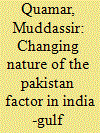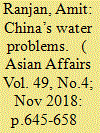|
|
|
Sort Order |
|
|
|
Items / Page
|
|
|
|
|
|
|
| Srl | Item |
| 1 |
ID:
161447


|
|
|
|
|
| Summary/Abstract |
India's relations with the Gulf countries started to flourish in the 1990s after India succeeded in de-hyphenating Pakistan from its policy toward the Gulf. Though Pakistan remained a factor as it continued to raise Kashmir and internal situation in India at multilateral forums such as OIC to evoke anti-India sentiments, it did not remain an underlying factor in as was the case during the Cold War era. In the contemporary dynamics, when India-Gulf relations are progressing toward strategic partnerships, Pakistan has re-emerged as a factor but its nature has changed. As highlighted in the joint statements issued during the Prime Minister Narendra Modi's visits to the Gulf countries since May 2014, India can now put pressure on Pakistan by highlighting its policy of sponsoring terrorism. This was evident when the Arab Gulf countries condemned the Pathankot (January 2016) and Uri (September 2016) terrorist attacks. India's relations with the Arab Gulf and other Middle Eastern countries are independent of their engagements with Pakistan and India-Pakistan tension, but New Delhi has stepped up efforts to raise the issue of cross-border terrorism and use of religion to incite terror activities against India during its engagements with these countries. It underlines the growing convergence between India and Arab Gulf countries over regional issues and the ability of India to isolate Pakistan over issues related to terrorism.
|
|
|
|
|
|
|
|
|
|
|
|
|
|
|
|
| 2 |
ID:
161448


|
|
|
|
|
| Summary/Abstract |
This article looks at the problems facing China in regard of its water supply and usage. It considers China's available water resources and their uses, the growing water pollution, and the water management system adopted by China to secure the country's future. This includes small and large-scale projects, dams, the South-to-North Water Diversion Project/South-North Water Transfer Project (SNWDP/SNWTP) or Nanshuibeidiao, and the Sponge Cities Initiative. It also looks at some of the policy issues and relevant legislative frameworks developed to respond to the problem. This article argues that despite the measures taken by the Chinese government, water remains an area of concern for China.
|
|
|
|
|
|
|
|
|
|
|
|
|
|
|
|
| 3 |
ID:
161449


|
|
|
|
|
| Summary/Abstract |
This article deals with a largely unknown British officer of the Indian Army, who served between 1900 and 1928 in India, Tibet, Burma, north-western Persia and Waziristan. It focuses on his unpublished diary from the British military expedition to Tibet in 1903-04, to which the present author has gained access. The written legacy of Harvey-Kelly includes a report on north-western Persia, various correspondence and five photo albums.
|
|
|
|
|
|
|
|
|
|
|
|
|
|
|
|
| 4 |
ID:
161445


|
|
|
|
|
| Summary/Abstract |
The results of Malaysia’s 14th General Elections held in May this year were unexpected and transformative. Against conventional wisdom, the newly-reconfigured opposition grouping Pakatan Harapan decisively defeated the incumbent Barisan Nasional. Despite a long-running financial scandal dogging the incumbents, an opposition victory had been all but discarded due to the advantages of incumbency, a deep fissure amongst opposition ranks, and a favourable economic outlook. Notwithstanding this, deeply-rooted political dynamics and influential actors came together, reconfiguring the country’s political landscape in the process. In order to understand the elections and their implications, this article sets out the country’s institutional context and then identifies key drivers and agents of change. From there, it assesses the conduct of the elections, analyses their results, and explores implications for the future.
|
|
|
|
|
|
|
|
|
|
|
|
|
|
|
|
| 5 |
ID:
161446


|
|
|
|
|
| Summary/Abstract |
The Kurdistan Region of Iraq (KRI) possesses many of the traditional hallmarks of political authority and society, such as state institutions (an Executive, Legislature, and Judiciary), political parties, civil society, elections, and local government. Nevertheless, for the past twenty-five years, it has failed to create a unified political system that adheres to a mutually accepted form of government. Political division, in particular, a rivalry between the main parties, has proved to be a real impediment to the political development and stability of the Region.
|
|
|
|
|
|
|
|
|
|
|
|
|
|
|
|
| 6 |
ID:
161440


|
|
|
|
|
| Summary/Abstract |
The dimensions of the crisis generated by the systematic persecution and expulsion of Rohingyas by the Myanmar authorities have been a sustained subject for global debate in these present times. The refusal of the Myanmar government to heed the world's warnings, its obfuscations in the matter of following through on the recommendations of the Annan Commission, and the dogged reluctance of Aung San Suu Kyi, once an ardent advocate of democracy and human rights in her country, to speak up for the Rohingyas have left the international community deeply disappointed. And disturbing too is a report by UN investigators on human rights abuses in Myanmar's Rakhine state. The problem does not look about to be resolved any time soon, with more than 750,000 Rohingyas taking refuge in neighbouring Bangladesh, pushing social dynamics in an already over-populated country to the edge. The fear is that the crisis could fester before getting dangerously out of hand, unless the global community goes for decisive action.
|
|
|
|
|
|
|
|
|
|
|
|
|
|
|
|
|
|
|
|
|